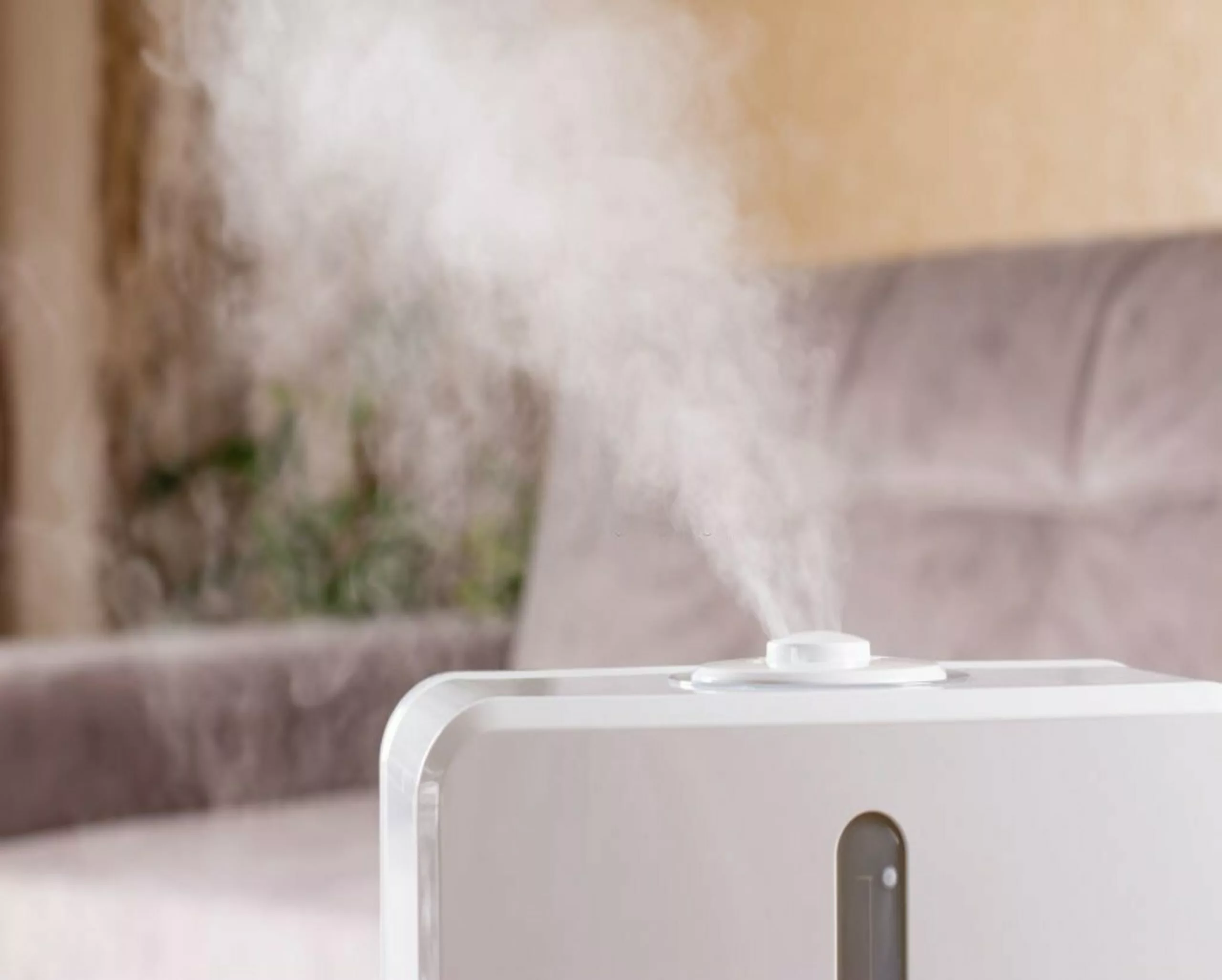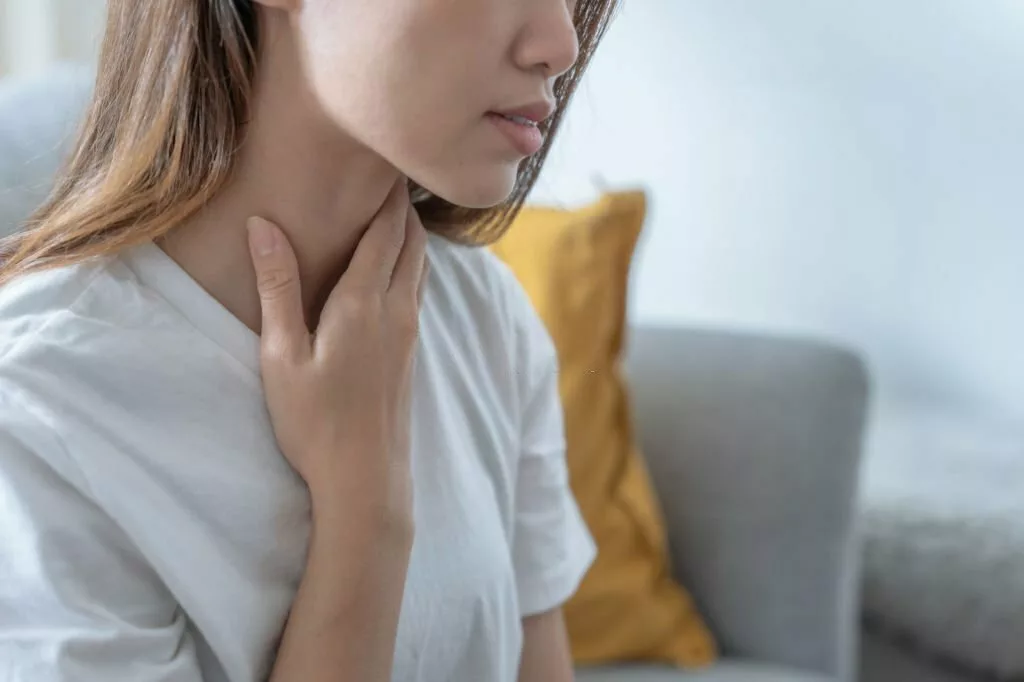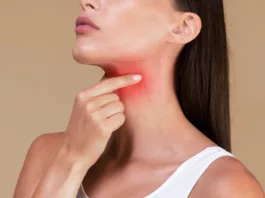Hoarseness is characterized by a husky and raspy voice, which is most commonly caused by an underlying disease of the larynx or vocal cords, such as laryngitis. Clinicians diagnose it through clinical examination and investigations to determine the cause. It can be managed with both conservative and specific treatments.

What is Hoarseness?
Hoarseness (dysphonia) is a condition characterized by a pitch or voice quality change, resulting in a weak, husky, or breathy voice. The sound is softer than usual and low-pitched. It is most commonly associated with a dry or scratchy throat.
Mechanism of Hoarseness
Normally, the sound is produced by the vibration of vocal cords. Vocal cords are two bands of smooth muscle present in the larynx, or voice box. When air from the lungs moves through the airway, it causes vibration of the vocal cords, producing sound. The quality, pitch, and loudness of sound are determined by the length, tension, and mass of vocal cords. The pressure and speed of air through the larynx also play a role in deciding the pitch of the sound. It occurs when there is a disruption in the normal sound production mechanism. The disruption can be due to inflammation, paralysis, lesions, or tension.
Causes of Hoarseness
Any condition that disrupts the vibration of vocal cords or normal airway anatomy can cause hoarseness. Some of the causes are as follows:
Vocal Strain
Overusing the voice can cause hoarseness. People who speak more loudly, like singers, teachers, and public speakers, will most likely get it. Yelling and shouting can also cause hoarseness. It is a temporary condition that settles in a few days by resting the voice, and the involvement of doctors is not necessary.
Laryngitis
The inflammation of the voice box is called laryngitis. It is one of the most common causes of hoarseness. Acute laryngitis accounts for 42.1% of cases of hoarseness, and chronic laryngitis accounts for 9.7% of cases1Reiter, R., Hoffmann, T. K., Pickhard, A., & Brosch, S. (2015). Hoarseness causes and treatments. Deutsches Arzteblatt international, 112(19), 329–337. https://doi.org/10.3238/arztebl.2015.0329. Viral infections, prolonged vocal strain, or other irritants cause inflammation.

Benign Lesions
Nodules, polyps, or cysts on the vocal cord can also interfere with the vibration of vocal cords, resulting in hoarseness2Upadhyay, A., Zaidi, A. K., & Mundra, R. K. (2019). A Comprehensive Analysis of Benign Vocal Fold Lesions Causing Hoarseness of Voice and Our Experience with Cold Knife Endolaryngeal Surgery in a Tertiary Healthcare Centre. Indian journal of otolaryngology and head and neck surgery: official publication of the Association of Otolaryngologists of India, 71(Suppl 1), 515–521. https://doi.org/10.1007/s12070-018-1377-5.
Malignant Lesions
Malignancy of the larynx in the area of the vocal cord also causes hoarseness. It accounts for 2.2 to 3 percent of all the cases3Reiter R, Hoffmann TK, Pickhard A, Brosch S. Hoarseness-causes and treatments. Dtsch Arztebl Int. 2015 May 8;112(19):329-37. doi: 10.3238/arztebl.2015.0329. PMID: 26043420; PMCID: PMC4458789.. An old person developing this condition should be tested for laryngeal cancer.
Reflux Laryngitis
Gastroesophageal reflux disease is a very common disorder resulting in stomach acid leaking back into the esophagus. When the acid reaches the vocal cord, it irritates and inflames them, causing reflux laryngitis4Korsunsky, S. R. A., Camejo, L., Nguyen, D., Mhaskar, R., Chharath, K., Gaziano, J., Richter, J., & Velanovich, V. (2023). Voice Hoarseness with Reflux as a Suspected Etiology: Incidence, Evaluation, Treatment, and Symptom Outcomes. Journal of gastrointestinal surgery: official journal of the Society for Surgery of the Alimentary Tract, 27(4), 658–665. https://doi.org/10.1007/s11605-022-05574-9.
Hoarseness from Allergies
Allergic reactions can lead to hoarseness. When a person is exposed to allergens, the body’s immune system is activated, which acts on different respiratory organs, including the voice box. Allergies can cause hoarseness through inflammation and swelling of vocal cords, postnasal drip (dripping down mucus at the back of the mouth due to allergic reaction), persistent coughing, and, rarely, laryngospasm. A study done by T Putus et al. found that hoarseness is associated with asthma, allergies, and respiratory infections5Putus, T., Vilén, L., & Atosuo, J. (2023). The prevalence and risk factors of hoarseness among pupils in South Finland’s elementary schools. Logopedics, phoniatrics, vocology, 1–7. Advanced online publication. https://doi.org/10.1080/14015439.2023.2187450.
Thyroid Gland and Hoarseness
The thyroid is a large gland located in the neck close to the voice box. Enlargement of the thyroid gland in conditions like goiter and thyroid nodules exerts pressure on the larynx, which affects the vocal cords. Moreover, in hypothyroidism (decreased levels of thyroid hormone in the body), deposits in vocal cords and edema of laryngeal tissue also cause hoarseness. During thyroid surgery, there is a risk of damage to the recurrent laryngeal nerve, which in turn causes hoarseness because it supplies the vocal cords6Junuzović-Žunić, L., Ibrahimagić, A., & Altumbabić, S. (2019). Voice Characteristics in Patients with Thyroid Disorders. The Eurasian journal of medicine, 51(2), 101–105. https://doi.org/10.5152/eurasianjmed.2018.18331
Other Causes
Other important causes of hoarseness include:
- Smoking
- Excessive consumption of caffeine
- Trauma
- Neuromuscular diseases
- Vocal cord hemorrhage
- Vocal cord paralysis
Symptoms of Hoarseness
The following symptoms may point toward hoarseness:
- A voice that sounds like the person is having a hard time talking
- Raspy and breathy voice
- Voice is softer than usual
- Voice is either higher or lower than usual
When to See the Doctor?
Hoarseness of voice is not an emergency condition, so there is no need to rush to the hospital when the symptom appears immediately. But, if the hoarseness is persistent and does not settle, consulting a physician is necessary. In children, if it lasts for more than a week, and in adults, if it lasts for more than ten days, see a doctor. Hoarseness could be a presenting symptom in children with Kawasaki Disease. Hence, it should be checked7Gámez-González, L. B., Ulloa-Gutierrez, R., Murata, C., Yamazaki-Nakashimada, M. A., Kim, E., Estripeaut, D., Del Águila, O., Garrido-García, L. M., Gómez, V., Faugier-Fuentes, E., Miño, G., Beltrán, S., Cofré, F., Chacón-Cruz, E., Saltigeral-Simental, P., Martínez-Medina, L., Tremoulet, A. H., & Astigarraga, N. (2021). Kawasaki disease presenting with hoarseness: A multinational study of the REKAMLATINA network. Pediatr Int, 643–648. https://pesquisa.bvsalud.org/global-literature-on-novel-coronavirus-2019-ncov/resource/pt/covidwho-897277?lang=en.
If there is an immediate loss of voice with the inability to speak coherently or form proper sentences, immediately consult a health expert because a serious underlying cause can be present. Similarly, in children, if hoarseness is accompanied by drooling from the mouth and difficulty in swallowing and breathing, immediately go to the hospital.
Diagnosis of Hoarseness
Since hoarseness is a symptom, its diagnosis is majorly clinical.
- Once a patient presents to the doctor, he will take a detailed history of symptoms’ appearance and progression, along with any associated complaints. It will help the doctor in recognizing the underlying cause.
- The next step is examination. The doctor will examine the throat with a light to find inflammation or abnormalities in the larynx. Examination is also done by a laryngoscope, which is an instrument containing a thin tube with a light lens and a video camera that provides a better view of the larynx.
- Depending upon the symptoms and the findings on examination, the doctor will suggest investigations that can include a throat culture, X-ray chest, X-ray of the head and neck, CT scan, complete blood count, or hemoglobin levels.
- The investigations will help the doctor establish a definitive underlying cause and plan the management.
Treatment of Hoarseness
The treatment of hoarseness depends on the underlying cause. If the cause is treated effectively, the hoarseness will subside. Some general measures for managing hoarseness include the following:
Conservative Management:
The conservative management includes:
Voice Rest
If hoarseness is due to voice strain, resting the voice will treat the hoarseness.
Hydration
It keeps the vocal cords moist and sometimes alleviates hoarseness 8Vermeulen, R., van der Linde, J., Abdoola, S., van Lierde, K., & Graham, M. A. (2021). The Effect of Superficial Hydration, With or Without Systemic Hydration, on Voice Quality in Future Female Professional Singers. Journal of voice: official journal of the Voice Foundation, 35(5), 728–738. https://doi.org/10.1016/j.jvoice.2020.01.008
Humidification
Using a humidifier can help add moisture to the environment, which opens up the airway and helps with hoarseness.

Avoid Irritants
Smoking and caffeine can make the symptoms worse by drying out and irritating the throat. Refraining from smoking and coffee can alleviate it.
Specific and Targeted Management:
The specific management would include the following:
Medications
Depending upon the condition, the doctor might prescribe medications ranging from antibiotics for infections to proton pump inhibitors for GERD and antihistamines for allergic reactions.
Voice Therapy
The doctor might refer the patient to a speech-language pathologist who provides exercises to improve sound quality and improve hoarseness. It is mostly important for professionals like singers and public speakers9Stachler, R. J., Francis, D. O., Schwartz, S. R., Damask, C. C., Digoy, G. P., Krouse, H. J., McCoy, S. J., Ouellette, D. R., Patel, R. R., Reavis, C. C. W., Smith, L. J., Smith, M., Strode, S. W., Woo, P., & Nnacheta, L. C. (2018). Clinical Practice Guideline: Hoarseness (Dysphonia) (Update). Otolaryngology–head and neck surgery: official journal of American Academy of Otolaryngology-Head and Neck Surgery, 158(1_suppl), S1–S42. https://doi.org/10.1177/0194599817751030.
Surgery
Their removal becomes necessary if the cause of hoarseness is persistent polyps, nodules, or cysts. Similarly, if cancer is the underlying cause, surgery may be required.
Thyroid Treatment
If thyroid nodules or hypothyroidism is causing the hoarseness, their treatment, along with conservative measures, will alleviate it.
Prevention of Hoarseness
Several actions can prevent this condition, which include:
- Avoid active and passive smoking.
- Stay hydrated.
- Wash hands properly to reduce the risk of viral infections.
- Avoid dehydrating fluids like caffeine and alcohol.
To sum it up, the change in voice quality is most commonly due to an underlying cause. Conservative measures are very effective in managing voice quality. It is important to identify the symptoms and gain professional help when conservative measures do not improve hoarseness.
Refrences
- 1Reiter, R., Hoffmann, T. K., Pickhard, A., & Brosch, S. (2015). Hoarseness causes and treatments. Deutsches Arzteblatt international, 112(19), 329–337. https://doi.org/10.3238/arztebl.2015.0329
- 2Upadhyay, A., Zaidi, A. K., & Mundra, R. K. (2019). A Comprehensive Analysis of Benign Vocal Fold Lesions Causing Hoarseness of Voice and Our Experience with Cold Knife Endolaryngeal Surgery in a Tertiary Healthcare Centre. Indian journal of otolaryngology and head and neck surgery: official publication of the Association of Otolaryngologists of India, 71(Suppl 1), 515–521. https://doi.org/10.1007/s12070-018-1377-5
- 3Reiter R, Hoffmann TK, Pickhard A, Brosch S. Hoarseness-causes and treatments. Dtsch Arztebl Int. 2015 May 8;112(19):329-37. doi: 10.3238/arztebl.2015.0329. PMID: 26043420; PMCID: PMC4458789.
- 4Korsunsky, S. R. A., Camejo, L., Nguyen, D., Mhaskar, R., Chharath, K., Gaziano, J., Richter, J., & Velanovich, V. (2023). Voice Hoarseness with Reflux as a Suspected Etiology: Incidence, Evaluation, Treatment, and Symptom Outcomes. Journal of gastrointestinal surgery: official journal of the Society for Surgery of the Alimentary Tract, 27(4), 658–665. https://doi.org/10.1007/s11605-022-05574-9
- 5Putus, T., Vilén, L., & Atosuo, J. (2023). The prevalence and risk factors of hoarseness among pupils in South Finland’s elementary schools. Logopedics, phoniatrics, vocology, 1–7. Advanced online publication. https://doi.org/10.1080/14015439.2023.2187450
- 6Junuzović-Žunić, L., Ibrahimagić, A., & Altumbabić, S. (2019). Voice Characteristics in Patients with Thyroid Disorders. The Eurasian journal of medicine, 51(2), 101–105. https://doi.org/10.5152/eurasianjmed.2018.18331
- 7Gámez-González, L. B., Ulloa-Gutierrez, R., Murata, C., Yamazaki-Nakashimada, M. A., Kim, E., Estripeaut, D., Del Águila, O., Garrido-García, L. M., Gómez, V., Faugier-Fuentes, E., Miño, G., Beltrán, S., Cofré, F., Chacón-Cruz, E., Saltigeral-Simental, P., Martínez-Medina, L., Tremoulet, A. H., & Astigarraga, N. (2021). Kawasaki disease presenting with hoarseness: A multinational study of the REKAMLATINA network. Pediatr Int, 643–648. https://pesquisa.bvsalud.org/global-literature-on-novel-coronavirus-2019-ncov/resource/pt/covidwho-897277?lang=en
- 8Vermeulen, R., van der Linde, J., Abdoola, S., van Lierde, K., & Graham, M. A. (2021). The Effect of Superficial Hydration, With or Without Systemic Hydration, on Voice Quality in Future Female Professional Singers. Journal of voice: official journal of the Voice Foundation, 35(5), 728–738. https://doi.org/10.1016/j.jvoice.2020.01.008
- 9Stachler, R. J., Francis, D. O., Schwartz, S. R., Damask, C. C., Digoy, G. P., Krouse, H. J., McCoy, S. J., Ouellette, D. R., Patel, R. R., Reavis, C. C. W., Smith, L. J., Smith, M., Strode, S. W., Woo, P., & Nnacheta, L. C. (2018). Clinical Practice Guideline: Hoarseness (Dysphonia) (Update). Otolaryngology–head and neck surgery: official journal of American Academy of Otolaryngology-Head and Neck Surgery, 158(1_suppl), S1–S42. https://doi.org/10.1177/0194599817751030





